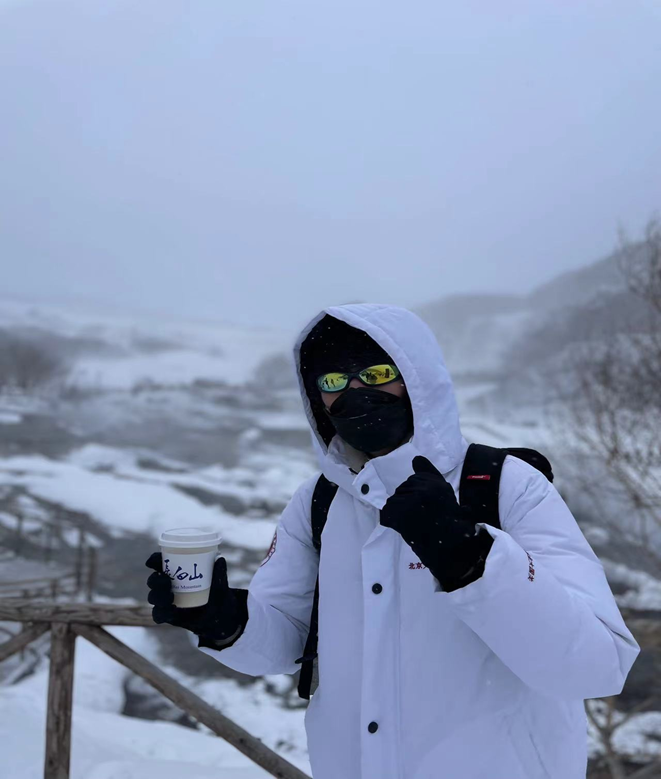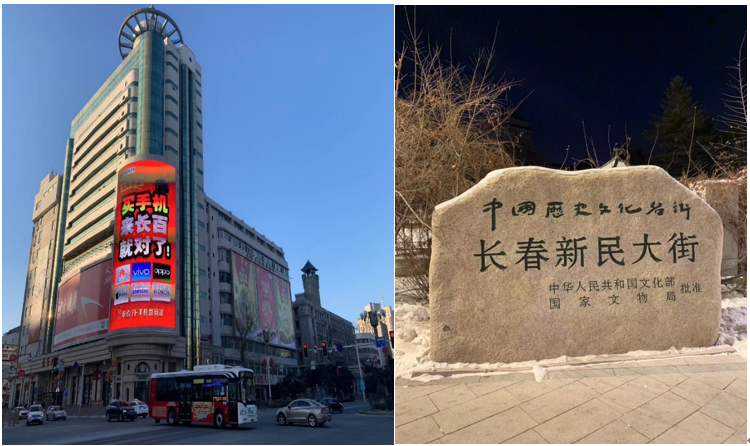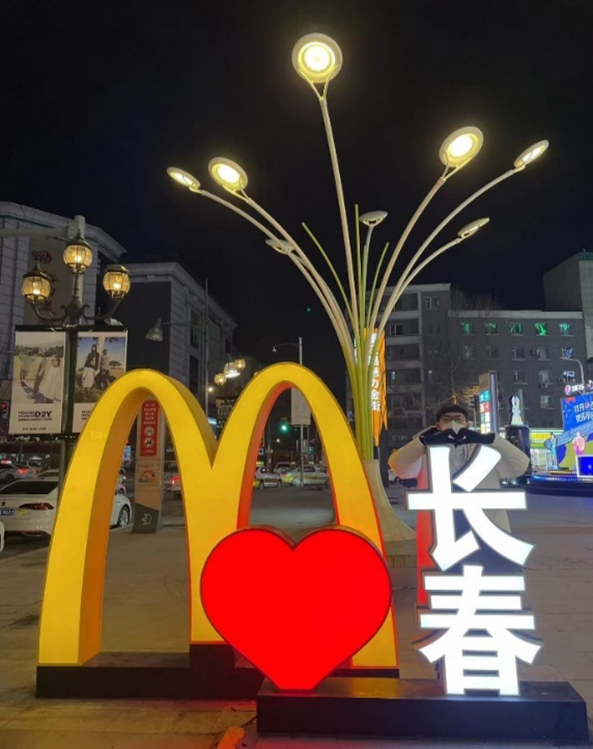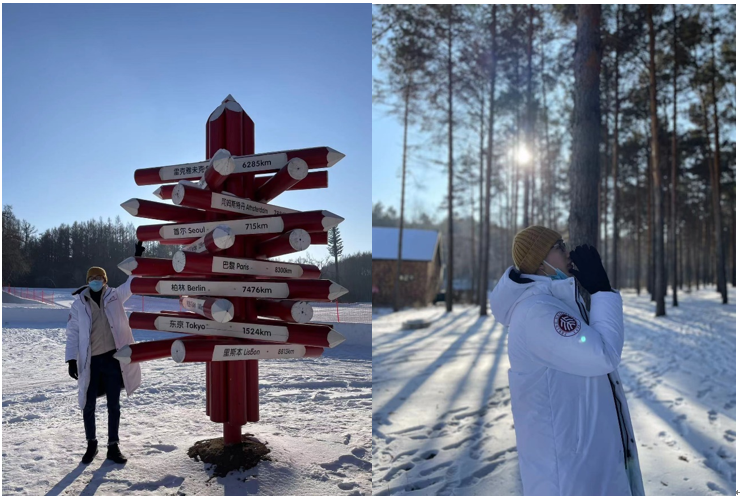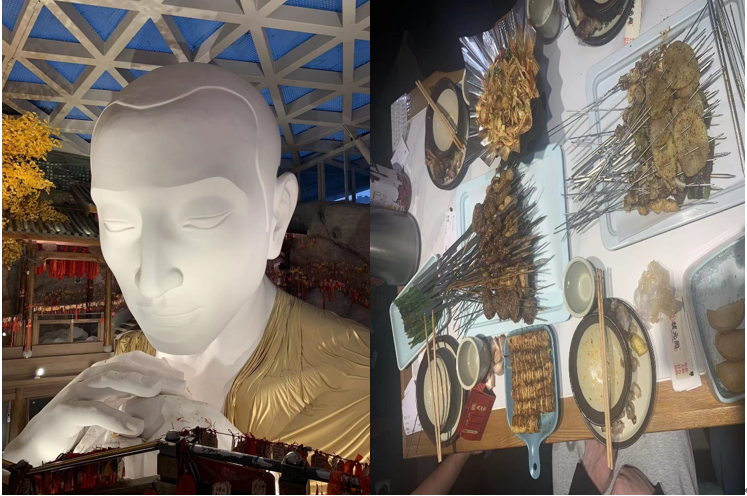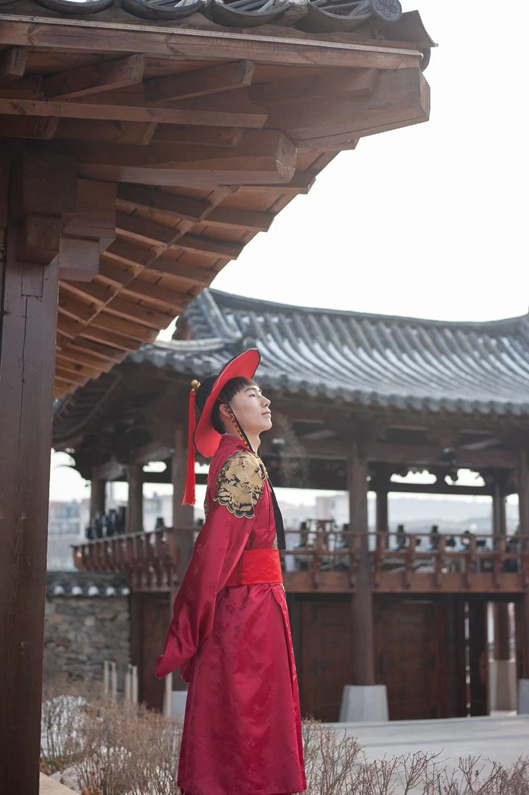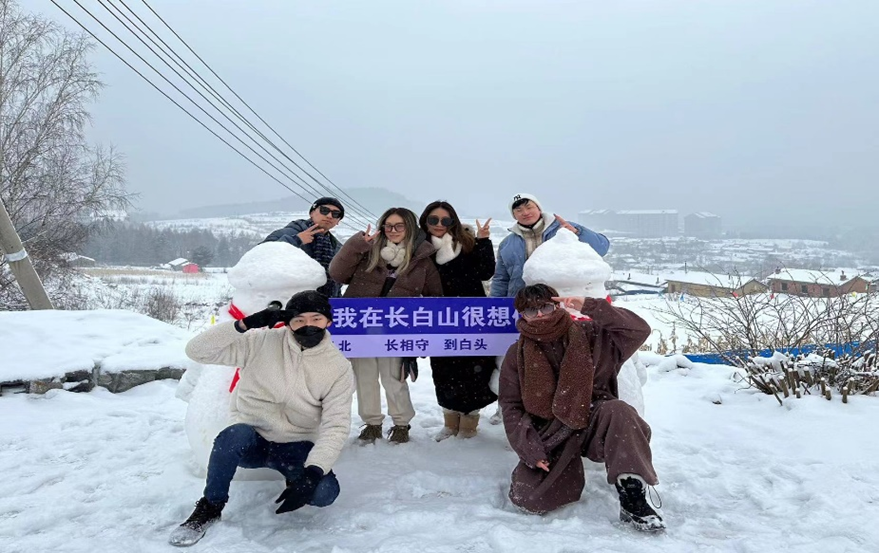Photo taken on January 8, 2023, at the top of Changbai Mountain, northeast China’s Jilin Province (Photograph: Vincent Jeong/PKU News)
Editor’s note: This year marks the 125th anniversary of Peking University, and it is also designated as PKU's Global Engagement Year. To commemorate this special occasion, PKU News is publishing a series of articles that feature the fascinating and unforgettable accounts of its international students studying and living in China. From northeast China's Jilin Province to the panda-abundant southwest China's Sichuan Province, as well as the bustling capital city of Beijing — Peking University's diverse student body from around the world is eager to share and showcase their journeys and experiences in China. In the following article entitled "How Changbai Mountain inspired me to be brave," please follow PKU student Vincent Jeong's adventure to the Changbai Mountain, a journey of exploring nature, embracing the unknown, and finding courage in between.
Beginning of a Journey
After a long and tedious semester filled with school assignments and research papers, I knew that a winter getaway was inevitable. This was right after the COVID-19 restrictions were lifted in China and borders were re-opened for commercial travel. At the time, every other student, including me, was keen about going away for a winter trip to distant places outside of Beijing. The practical choices were either to go for a sun-tan on the beach in Sanya, south China's Hainan Province, or take a hike atop the fabulous gorges of Changbai Mountain. I chose the latter.
Before embarking on this trip, me and my pal, Victor, decided that we should seek out other students who were interested in joining us. Victor is one of my roommates and a best friend that I have come to know at PKU. He was delighted to accompany me when he heard of my inclination to go for a winter tour, for companionship is the essence of travel and more companions mean more fun. To our surprise, we learned that Jennifer, another PKU student from the School of Economics, had already planned out a trip to Changbai Mountain a few months prior to the winter break and was also looking for companions. Naturally, we joined up and our crew included more of our peers like Andy, Vivian, and Colin. With the crew assembled, we were ready to plot a course for our destination. Our itinerary consisted of firstly exploring cities like Changchun and Yanji (a county-level city in Jilin Province) and then driving to Changbai Mountain, which would be our final destination.
It was fortunate that we booked our train tickets and accommodations beforehand since the prices would skyrocket during the Spring Festival. It is a common phenomenon for the Chinese to travel during the holidays because traveling is one of the few decent ways to ease the pressure from both work and study nowadays. Besides, younger generations tend to view travel as an opportunity for them to try out new sorts of things and expand their perspective of society. It also has been a trend for tourist agencies and social media apps to exploit the preferences of consumers to generate revenues and increase the awareness of visiting or purchasing local specialties. In general, transportation costs would rise under the fervor of tourism and various hotel chains would offer special discount packages for newcomers. From our experience, in order to reserve rooms for the hotel at Changbai Mountain, we had to contact several intermediaries that offer discounted packages because of the exorbitant price range.
In the end, our crew members were fully equipped and prepared to set off for this incredible journey. The first stop would be Changchun, the provincial capital of Jilin Province located in the Northeastern side of China.
Welcome to Changchun!
It took us no less than four hours to arrive in Changchun by high-speed rail. The tracks covering Northeastern China were surrounded by snowy hills and tiny villages which represent the tranquil scenery of a cold winter landscape. The scenes somehow reminded me of taking the train to Seoul back in Korea during winter, where there were also tiny villages and snow-covered hills following the nearby mountain pass. Anyhow, when we arrived at Changchun, the temperature was a little chilly, though the city had less wind than the capital. As we headed for the place where we would be staying for two nights, I immersed myself in observing the century-old landmarks and buildings that greeted us. To my understanding, Changchun is famous for its car manufacturing industry as it stands as the birthplace of Hongqi (红旗), a modern Chinese car brand. History-wise, Changchun served as a central hub for Manchukuo (a puppet state established by Japanese invaders to control northeast China from 1932 until 1945) to carry out their administrative tasks and exert control over the Northeastern portion of China. After the Chinese People's War of Resistance against Japanese Aggression ended, Changchun became the industrial city for modern China to work on its manufacturing sector. Most of the governmental complexes are being preserved for the public to reminisce and remember the importance of their city.
Our crew checked in to the hotel around 5 p.m. and soon headed out to Jilin Boulevard, which is similar to Beijing’s Wudaokou (五道口) where young teenagers and university students like me would visit at night to try out different varieties of street food and sweets. As we toured the neighborhood, I managed to discover that there were not that many people out in the streets like in Beijing. One of the locals we met on the road told us that the residents would rarely leave their houses during the winter because of the cold weather. Besides, he added, young people in Changchun would mostly relocate to other cities in search of jobs and opportunities.
After having to taste sugar-coated haws and barbecues, our crew went back to the hotel to call it a night. As I looked down at the streets from my hotel room, I had a hunch that my adventure for the next day would be exciting.
First day in Changchun, Jilin Province
On the next day, our crew got up early and went to a restaurant for brunch where they serve traditional Northeastern Chinese cuisines. We ordered sweet and sour pork, sugar-coated baozi (包子), pork ankle with wrapped flour and potted lamb meat, etc. The people here enjoy consuming meat because of the cold weather and each of the food is served with specially-made sauce. I enjoyed the sweet and sour pork for the meat was extremely crunchy and well mingled with its sweet and sour sauce. As for the sugar-coated baozi, it tasted like cotton candy which did not appeal to me. Once we finished eating, we visited a renowned national scenic area called Jingyuetan Park (净月潭公园).
The park was so beautiful that words are hardly enough to describe it. I recall that the park’s unique forest spans several kilometers across the river and that most of the trees were covered with white snow which drew a spectacular sight. What did attract me was the wooden sheds located near the skiing arena since the park managed to recreate conventional Chinese wooden housing to draw the eyes of tourists. Even the snow igloo was hand-crafted to create a decorative environment for tourists to enjoy many of the colored lanterns hanging alongside the poles and revel in the splendid winter landscape. It was here that made me want to pick up snow and throw it onto someone else.
A few hours of sightseeing in the snow led us to get wearied but we still had one place to visit before we conclude our trip in Changchun. In Chinese, the place is named Zheyoushan (这有山) which means “there is a mountain here.” Considering that the literal translation is a bit out of place, the owners called it “The Hill” in English. When I heard the name for the first time, I thought “could this mall be located on top of a hill?” In reality, the shopping mall is constructed in a hill-like fashion to make visitors climb the stony steps all the way to the top and pray to the Buddha statue. After making a wish in front of the statue, visitors would scribble letters on the stony wall and leave some good messages. I did not write anything on the wall but I threw coins down to the fountain below the statue and prayed for a better ending to my school years at PKU. Aside from the statue, The Hill housed many stores suitable for youngsters to go on their first date or family members to have fun. Having been to many malls in Beijing, The Hill rose the ranks to become one of my favorite malls in China.
Afterward, we were exhausted and starving that we went to a barbecue restaurant for some meat and beer. If someone were to ask me what my favorite food in China is, I would answer barbecue, especially barbecued lamb meat. What I love about barbecue is that they provide an adequate amount of meat for diners to relish and have a bottle of cold beer. Same as fried chicken and beer in South Korea, there can be no mistake with teaming-up barbecue and beer in China. As the hour passed by, I knew that we had to rest well and prepare for our trip to Yanji the next day. Who would have ever thought that I dared to visit the China-North Korea border?
Second day at Changchun-Jingyuetan and The Hill
Mission: Possible
To this day, I would still consider Yanji to be a truly memorable spot among my travels. Yanji is located within Yanbian Korean Autonomous Prefecture and retains the Korean ethnic group in China whose main form of communication is the Chaoxian language (朝鲜语), which is the Chinese Korean language. The difference between the Chaoxian language and Korean lies in the Anglicization of some words. For instance, a football goalkeeper in Korean would be pronounced “goalkeeper (골키퍼)” which is similar to English. The Chaoxian language, on the other hand, would call it “munjigi (문지기)” which leans closer to the conventional dialect. In retrospect, before the two Koreas were divided, the country was called Choseon (Chaoxian in Chinese) for four centuries, so there is a large debate among scholars about the cultural distinction between Korean ethnic group and Koreans. The Chinese government has done a tremendous job in preserving the culture and language of Korean ethnic group by allowing every store in Yanji to write in Chinese and Korean as well as educating the populace with a little bit of the Korean language. If we open a world atlas and look at Yanbian, we could easily find that one of its towns is called Tumen (图们) and is located next to North Korean territory whereby tourists would visit just to take a picture standing alongside the China-North Korean border. Other than that, the name Tumen picks up from its river Tumen River, hence the nomination.
When our crew first arrived at Yanji, Jennifer and the others decided to take a short rest in the hotel which left me and Victor to take the train and head to Tumen. The train only took us 20 minutes to arrive at our destination so it was a quick trip. The environment in Tumen resembled the peaceful villages that I saw on my way to Changchun in that it did not have that many high-rise buildings and solid infrastructure to call it a developed town. When we hailed a cab to get to the China-North Korea border, we discussed the current status of the town with the driver, who has lived in Tumen for over 40 years. He said that when the border was open for tourism, many Chinese tourists could cross the bridge over to North Korea for travel.
Getting off the cab, we saw that the borderline between the two countries was sealed with a steel gate that prevented trespassers from entering the vicinity. Next to the steel gate, a scarecrow wearing a military uniform stood on the field. There was a sign that read, “in front of you is North Korean territory, any trespassers will be dealt with accordingly!” In my life, I had never thought that there would come a day for me to see North Korea with my own bare eyes. Knowing that there exist some historical and ideological animosities between my country and North Korea, there were some tensions in my mind that forced me to be on my guard at all times. This visit to Tumen was not an ordinary trip per se. It was a trip that enabled me to overcome my inner demons and explore the unknown. Although the reality was not that scary, I felt the nerves getting onto me. Looking at the North Korean patrolmen and the two portraits of the former leaders of North Korea across from the observation deck, I felt like I was in a James Bond movie. It made me wonder what the real North Korea looks like across the bridge and whether the people living there would welcome outsiders. A “Mission: Impossible” in my previous years transitioning into “Mission: Possible,” I achieved one of my bucket list goals to see North Korea.
As we finished observing the scenery that lay in front of us, we took a brisk walk to reach the China-North Korea border monument. On the monument, the official Chinese insignia was carved into it and there were dates and numbers painted in red. After taking a few pictures, the two of us went back to the station and took the incoming train to Yanji.
Arriving at Yanji, our other crew members contacted us to meet in front of Yanbian University. We got there just in time to reunite with the crew and take several pictures as a group. Once that was out of the way, we walked around the neighborhood and arrived at a restaurant serving pork. At first, the restaurant was crowded with customers that we thought we would not get a table. Then, out of confidence, I went into the restaurant by myself and looked for the manager. I directly asked her how long we would wait to get a table. She answered in the Korean language that it would probably take two hours. Following this, I used my charm to persuade her and told her that “as a Korean, I have always wanted to come to Yanji and experience what the city has to offer. Right now, I am in a group of six and we will only be staying here for one night. Before I leave tomorrow, I would love to enjoy the food with my dear friends and celebrate the moment. I understand that many customers are waiting in line to get a seat and that you are busy, but if you are to invite us in, I will be forever grateful and could take some good memories back to South Korea.” The manager pondered for nearly five seconds, then said “Sure thing! Please bring your friends inside, we might have just the room for you all!” That was how I managed to successfully bring my pals into the restaurant without having to stand in line for two hours.
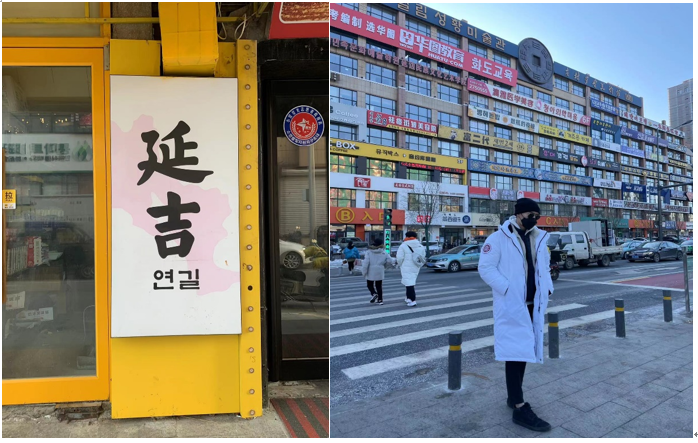
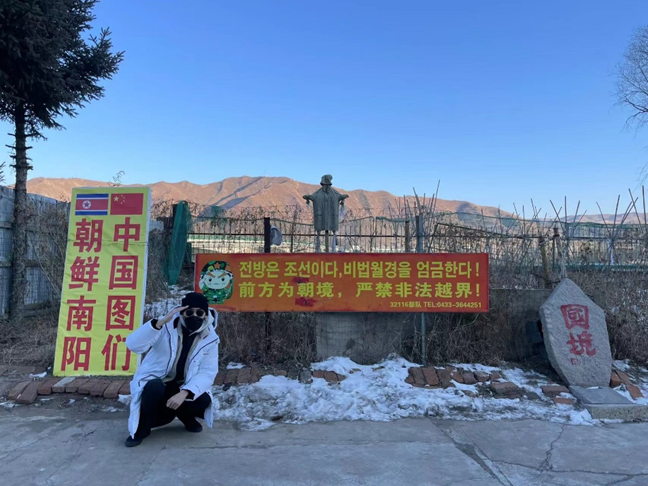
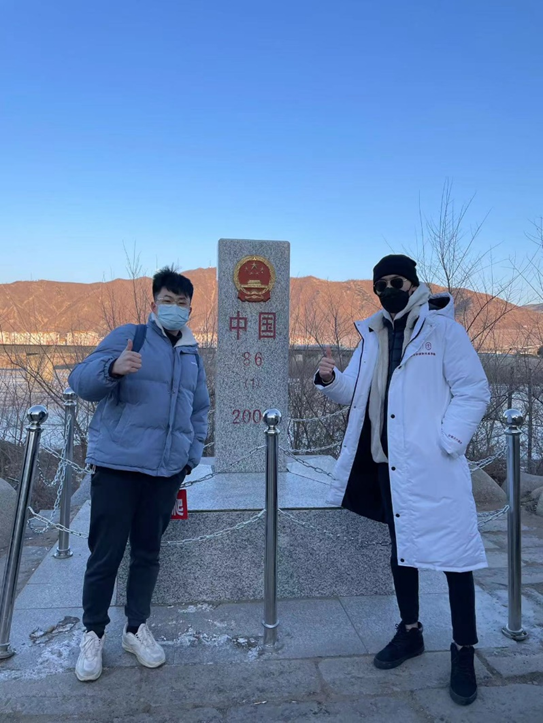
First day at Yanbian-On the China-NK border
Following a wonderful meal, our crew returned to the hotel to conclude the day. On the next morning, Colin and I alongside Jennifer and Vivian visited the Yanji folk-culture village to dress up as kings and queens and take pictures. Colin chose blue and white-colored clothing while I went for the reddish one with the tiger insignia. In earlier times, the blue and white-colored clothing usually signify the status of a prince while the red one is a king. The tiger insignia was originally crafted to identify the Kingdom of Choseon and the old kings were forbidden to wear an outfit painted with a dragon since that was only allowed for the Chinese emperors. Adorned with lavishness, we followed the photographer to take pictures all around the village. From the wooden sheds to the Kimchi pot fields, the village was a mere representation of the traditional lifestyle of Choseon. Dressed up as a king had its benefits since the people whom we crossed paths with all complimented me on how the outfit suited me. My buddy Victor appreciated the hat I was wearing so much that he often picked it up and wore it himself. It was not the first time for me to dress up in traditional clothing for I had done it in my country several years ago. However, it was a first for me to dress up in China, which makes it memorable.
The dress-up in the folk-culture village was over by the time we finished taking pictures. We left for the Jeonju Bibimbap afterward for lunch and spent the whole afternoon at Yanbian National Museum to dive deep into the history of this area. When it was nearing 5 p.m., we went by a Korean shaved ice café and had three different flavors of shaved ice: blueberry and cheese, rice cake and red beans and strawberry.
With a full belly, our crew arranged for a driver to deliver us to Changbai Mountain Resort. The road was long and it took us six hours to get there. On the road, we had the Dongbei chicken stew but it was not as delicious as we had hoped. We knew that it was night and we were close to falling asleep before we had reached our destination, but in all our hearts we were excited to finally engage with the beautiful white wilderness of Changbai Mountain.
Second day at Yanbian-Dressing up as a king
On Top of the World
It was close to midnight when we arrived at the Wanda Hotel at Changbai Mountain and my companions were very exhausted from the long-distance drive. Checking into our rooms and bidding farewell to each other, I immediately went to take a hot shower and slept for the night. The next morning, we arranged for a vehicle to take us to the place for river drifting. River drifting is one of the popular activities you can find in Changbai Mountain, in which a two-man boat will take you up to the river within the forest. While drifting, you could hear the sound of the water flushing down the shore and observe the misty wilderness. During the drift, I remember that Andy and Colin’s boat got stuck near the crevice and they needed our help to push the boat back to the river trail. Imagine if we were not there, how would the two be able to escape from that?
For the next stop, we went to the mountain plains to ride the snowmobile. Riding the snowmobile was the fun part of Changbai Mountain because the driver can get to feel the speed and hear the engine humming. I hardly rode a snowmobile before so it took me a while to get the hang of it. After a few rounds of driving practice, I assure you that the snowmobile runs like a fully bred-horse. Like one of those action film sequences, I drove the snowmobile at maximum speed to jump across the slope and experience the full might of the vehicle. I even hit some tree branches along the way and fell from the vehicle, though I was fortunate enough to prevent myself from getting injured.
It was until right after lunchtime that we finished riding the snowmobile and were bound for the Changbai Mountain Forest Park. The entrance to the park was heavily caught in traffic that we had to get off the station wagon to reach the ticketing booth on foot. Entering the ticket booth, I had never seen such a crowd moving left and right, up and down to buy tickets. As a person who enjoys calmness, I dislike people moving around shouting one’s name and pushing one another. It just reminded me of a disorganized marketplace back in Korea where citizens would move rapidly to buy seafood. Most importantly, I hate that the sky had gotten dark. A dark and gloomy day normally influences me to be in a low mood and feel the urge to just lie down on a bed and rest. Unfortunately, I was in a position where there were no options to get out from a handful of crowds. I felt the warm heat and the smell of sweat from the crowd standing in front of me as I took my wait to purchase the tickets.
One hour had passed and the tickets were finally in our hands. We quickly paced forth to the top of the Forest Park while avoiding the slippery ice. Falling on snow would not hurt, but ice plays differently. Once you land hard on ice your body would get bruised and the chilliness would overflow through your veins. I had that sort of experience a few years ago back in South Korea and I was not ready to repeat it. Around the time we got to the middle of the park, we found a shack where they sell lamb barbecue sticks. Considering that we had not eaten lunch, we filled our bellies with some meat and tea before heading out again. Luckily, there were several horse sleighs arranged for visitors who want to go to the top so we took one of those by paying an extra fee. It turned out that riding in a sleigh does not feel bad at all because it was interesting to see the horse pounding her foot on the snow while she took us to our destination. Reaching the top, it was hard for us to walk around due to the heavy snow. Hence, we decided to ride one of those snowmobiles and head back down to the ticketing station.
I assume it was probably a quarter past six did we get in the car back to the hotel. Having arrived at the hotel earlier than expected, we looked for a Korean barbecue restaurant and had some decent fried pork. Dinner was finished, our schedule for the day has ended and it was time for us to turn ourselves in for the night. Before doing so, we had to make a stop by the local ski shop to confirm our ski clothes which we would wear the next day at the ski resort. Earlier in Beijing, Jennifer managed to find this shop where they offered ski clothes and equipment for a reasonable price range. The procedure dictated that before coming to Changbai Mountain we ought to reserve the items in advance. Afterward, we could pick up the items on the day of the skiing and return them with our deposits intact. For a bonus, the shop would reimburse 200 yuan for each client only on the condition that the items should be returned fully. After confirming with the store clerk that our items are ready, our crew walked back to the hotel for a good night’s rest.
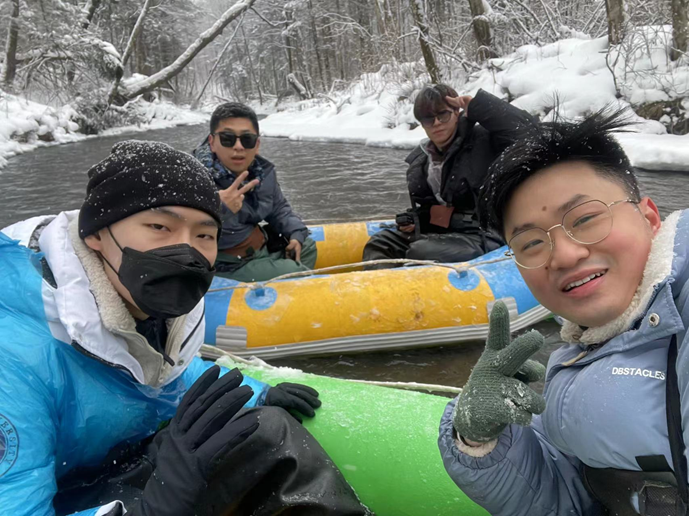
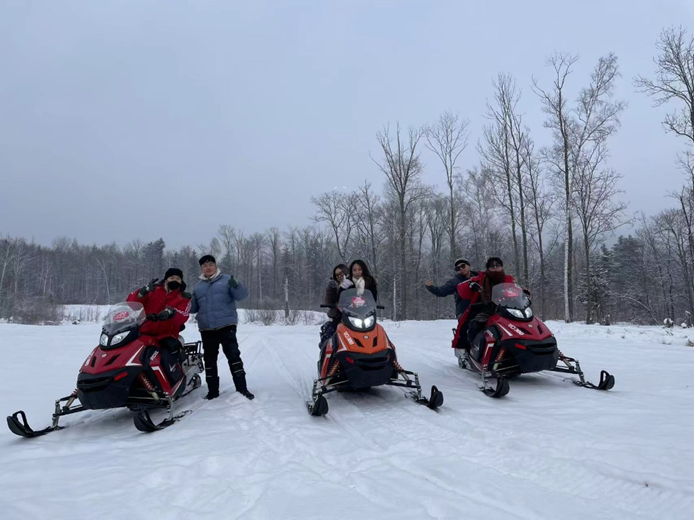
First day at Changbai Mountain-River drifting and riding the snowmobile
As morning approached, I headed down to the hotel cafeteria to grab breakfast. My breakfast consisted of cornflakes, a bottle of fresh orange juice, and bacon and eggs with some tomato sauce on the top. It had been so long since I had a proper western-style meal and I enjoyed that exact moment as I turned my eyes to the window beside me, observing the scenery of the frosty mountains and hotel staff brushing off snow with their brooms. The sun appeared to be coming up anytime soon and I wanted to cherish this minute as much as I could because I am unsure whether I would be visiting Changbai Mountain again in the next few years. Once the crew finished their meals, we split into two groups and each took a car to Changbai Mountain Outpost.
Arriving at the outpost, we had to purchase a ticket for the bus ride to the peak of the mountain. Due to the unusual change in the weather, the local officials prevented us from going to the lake area. Changbai Mountain Heaven Lake (天池)is the most well-known spot for mountain hikers and ordinary tourists because of the grandiose sight laid down on the center of the mountain. If you look at pictures on the Internet, the lake is roundly shaped and the snowy mountains are being functioned as a shell to protect the lake from natural threats. In the summer, the blue water lake is magnificent and many spectators would return to their homes and recommend to families and friends about going to Changbai Mountain for vacation. One thing is for sure, I was one of those people who heard about the splendor of the lake and decided to be there in person.
Getting onto the bus bound for the apex, I noticed that most tourists were young students like us traveling with friends. I sat next to a woman who came alone by herself and was drinking coffee. I assumed that the coffee she was drinking was none other than Americano because the scent of the coffee beans is strong and bitter. The ride would take close to an hour and I did not want to fall asleep. I sensed that the woman did not want to doze off either but the two of us just kept silent throughout the rest of the journey. In my mind, I would like to ask her where she was from and whether or not she found her trip to Changbai Mountain interesting. My lips were opening as I wanted to spit out the first word but it was impossible. Struggling for an hour to talk with a stranger eventually had a big help in passing out the time. The bus stopped and the driver announced through his speakerphone “everyone, this is the stop for Changbai Mountain apex! Please take good care of your belongings and step out of the bus carefully.” I could hear the call of the frosty mountains as I stepped out of the vehicle with enthusiasm.
I was literally on top of the world at that point. Although Changbai Mountain cannot compare to the altitude of Mount Qomolangma, its atmosphere and landscape helped me to picture that "you are standing at the top of the world and this is your time to confirm how far you have gone to be here.” What was it like to stand on that spot and climb up the mountain? Freezing, anxious, but most of all, exhilarating. The mountain path was organized like a snow garden by which there were wooden platforms to get across from one point to another and in the middle of the path were some convenience stores where you could buy freshly-made Changbai Mountain ginseng milk tea. Opposite that lay a very long staircase for travelers to ascend and arrive at Heaven Lake. That morning, Heaven Lake was closed for viewing so we could only stride near the mountain cluster and take a shot at the amazing spectacle. Moving my foot one step at a time at a slower pace, my breathing was getting quicker and I barely could feel the tingle in my face. I believed that despite wearing winter jackets and several layers of clothes, the temperature of the mountain could overrun you in an instant. That is why whenever I watch those documentary films about hikers on Mount Qomolangma, they would always acknowledge that the mountain gets to swallow the people.
However, despite my impression of the mountain, I was more interested to see that half of the tourists were actually from Guangdong (a coastal province in South China). It might seem rather strange but everywhere I went, there were utterings in Cantonese. My friend, Victor, could speak Cantonese so he would often mingle with the crowds to try to gain some information about the scenery. I remember a bunch of tourist groups from Guangzhou and they had a tour guide to lead them through the mountains. Even the little children spoke Cantonese with their parents which allowed me to think “how can it be possible that there are fewer Dongbei locals than Cantonese in Changbai Mountain?” If we think more easily, it is safe to say that Chinese southerners would regularly carry out their travels in the north of China whereas Chinese northerners would head down to the oceans and enjoy the tropical environment of the sunset beach. China is vast which makes traveling much more meaningful since each city possesses its unique features.
After completing one of my goals to reach the top of Changbai Mountain on this journey, I took the return bus back down to the outpost with my crew members. Along the way, the bus stopped at a few locations such as the Changbai Mountain waterfall area and the Changbai Mountain forest maze. Having finished a five-hour tour of Changbai Mountain and eaten dinner, we returned to the hotel to prepare for our next move, which was going skiing.
The skiing resort was located less than one kilometer from our hotel so we got plenty of time to suit up in our gear and head over. The structure of the skiing area was surrounded by many beer pubs and overrated restaurants for barbecues. Under normal circumstances, restaurant chains that are inside a resort serve bad food because they only think about emptying the pockets of incoming tourists. Practically, the skiing arena is tied to the Hyatt Hotel next to it and hotel guests can swing by the arena and hone their skiing skills anytime as long as they pay the extra price.
All of our crew members chose to monoski except for me. I selected the original double-boarded ski and hired a personal tutor to teach me how to navigate the grounds. It was not the first time for me to ski because I had done it when I was in my undergraduate years back in Korea. Yet, I have forgotten all of the basics and had to refresh my muscle memory so that I could at least enjoy the sport without embarrassing myself. The result, however, was an ultimate failure. My legs could not move despite my brain ordering my body to switch directions and my knees were stuck stone-cold. The tutor kept pushing my legs to move but they did not budge. Whenever I fell or wanted to move ahead, the tutor would have to pick me up all the time. An hour had passed and I could feel that it was not worthwhile to continue skiing. When you know something could not be executed even though you want to, you begin to look for plan B. The alternative was to just chat with the tutor, make friends with her, and ask her to take a picture of me in skiing apparel.
My crew and I ended the skiing session approximately at 10 p.m. and headed to a cocktail bar for some drinks. There were dartboards, a table to play pool, and a stage for guests to chill and sing their favorite songs so we had enough fun for the night. I ordered a shot of Scotch to warm my body and relaxed on the sitting couch as I know that this will be the final night for me to remember before I finish the journey the next day. A few of our crew members got a little drunk but we were still sober to grab some fireworks from our hotel and blow them off outside of the entrance. The night was radiant as we saw the sparks flying all over the place and lighting up the atmosphere. This was a typical night in which youngsters would do great things to celebrate. Before we went to sleep, we bought some cup noodles and ate them in our rooms. Until now, I still think that having those chicken cup noodles was an excellent choice to have spent the night.
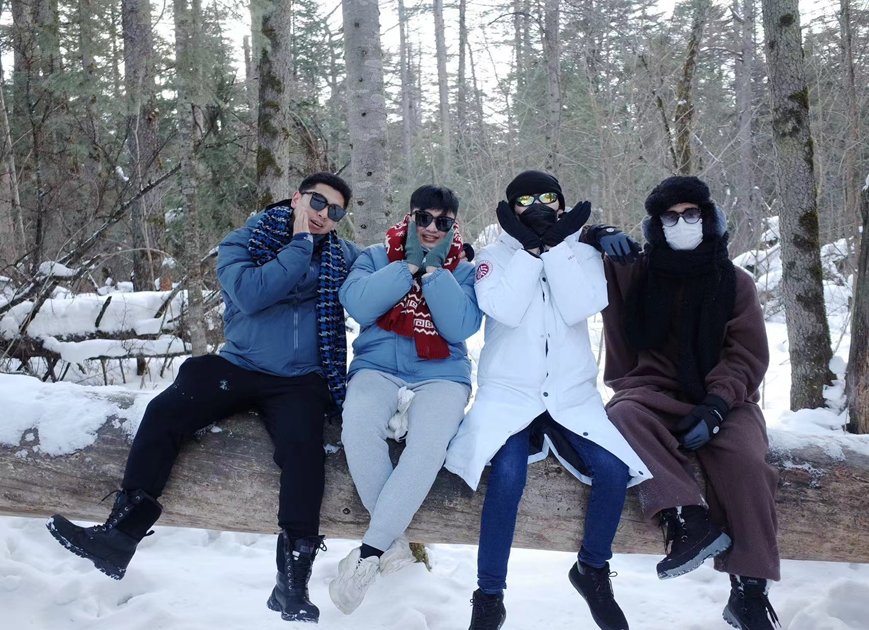
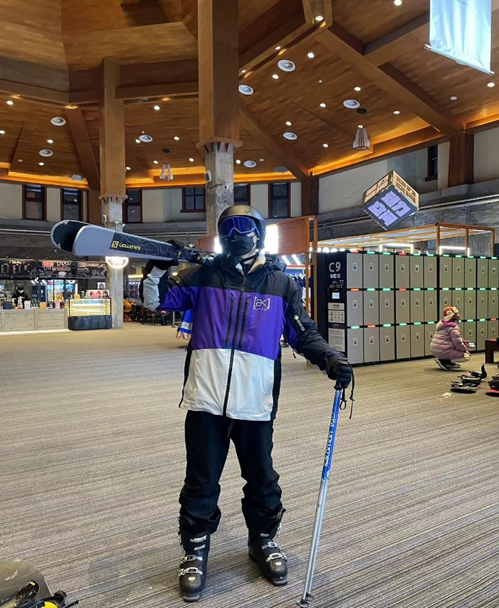
Second day at Changbai Mountain-Group photo and Skiing
A Lovely Farewell
Like that famous saying, “time flies like an arrow,” the one-week journey to Changbai Mountain came to an end as each of our crew members parted ways in Changchun. Andy went back to Shenyang by car and Victor and the others took the airplane back to Guangdong in order to be with their families. I decided to go back to Beijing because my friend from Korea had gone to Beijing Foreign Studies University for the winter Chinese language exchange program and he asked me if I could take him sightseeing around the city. As much as I wanted to visit my relatives in Guangzhou, my grandfather would not allow me to go back due to the epidemic. It has been almost four years since I have not seen my grandfather and I also dearly miss my parents who are still in South Korea. Nonetheless, I was glad that my best friend from Korea visited me in Beijing, for it served as a great excuse for me to spend a meaningful Chinese New Year by myself.
A month has passed and I still enjoy reliving the memories I made with my friends in Changbai Mountain. This journey offered a few indicators for me to grow up. First of all, a trip like this allows me to learn about the world from another’s perspective and elevates my knowledge to a deeper level. Based on how much people value the power of gaining knowledge, I suggest that regardless of which country or city you are traveling to, always seek out companionship. A better companion can present insights that you have not known before and make your journey significant. Second, doing something that one has not yet done and challenging oneself to step forward proves that a person can overcome fear through confidence. A confident mind can suppress previous agitations inherent in one’s heart and dispense them through courageous actions. The experiences in Yanji and Changbai Mountain are perfectly exemplary of how I tried to solve a problem and explore possible alternatives with confidence. Third, every step of a journey should be cherished properly. By sharing my thoughts about the journey with some other folks, I can circulate and revisit those experiences that I have gone through. To talk is to inspire and to see is to believe. I hope that my tale of the adventure will inspire many to be brave in making decisions and engaging with a new environment. Just like how Changbai Mountain motivated me to take one step at a time to reach its peak, I do hope that anyone could meet their “Changbai Mountain” and push themselves forward.
On a final note, I would like to express my sincerest love to my friends Victor, Andy, Jennifer, Vivian, and Colin. You guys are the best!
Vincent Jeong with his friends
Written by: Vincent Jeong (Vincent Jeong is a postgraduate student from South Korea; he is currently studying international relations at Peking University)
Edited by: Dennis Meng
